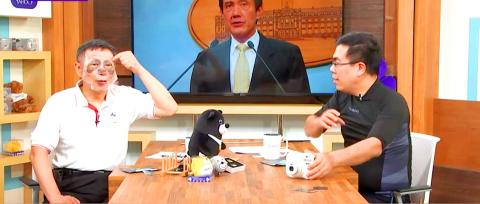The Summer Universiade presents an opportunity to reorganize and mobilize local governments, and supporting the games is a way to support the nation by showing its best side to the world, Taipei Mayor Ko Wen-je (柯文哲) said yesterday.
Ko made the remarks on a Yahoo TV program, hosted by meteorologist Peng Chi-ming (彭啟明), in which Ko spoke about this month’s Universiade in Taipei and political issues.
Peng said that many Taipei residents seem to be distant from the Universiade because they are not university students anymore.

Photo: Screengrab from Yahoo TV
Ko said public opinion polls conducted by the Taipei City Government showed a majority of Taipei residents thought the games have nothing to do with them.
“It affects the city government more than the residents,” he said. “We need cooperation among local departments and between local governments where the venues are located, so it is a chance to integrate, coordinate and mobilize the [local] governments, similar to a military drill.”
Repeating the slogan “Let Taiwan take a step outward and let the world come in” he used to promote the games, Ko said: “What is more important than holding the event is to allow the world to see Taiwan.”
The city spent nearly NT$100 million (US$3.3 million) to recode the Taipei MRT system, designating a specific color for each MRT line, and a letter and a number for each station, so that foreign visitors can find their way more easily, Ko said.
Other preparations include placing English-language road signs along roads and English-language content on official tourism Web sites, he said, adding the efforts contribute to making Taipei a more globalized city.
Peng asked Ko about his view on the Cabinet’s Forward-looking Infrastructure Development Program, as Ko had criticized the proposed railway projects, to which Premier Lin Chuan (林全) responded by saying Ko’s remarks were indecent.
“Were my remarks wrong? Everything I said hit the nail, that is why he [Lin] said I was indecent, but you cannot expect me to hit with a feather,” Ko said.
“There is the joke that the government suddenly realizing that I do not belong in the pan-green camp when it starts dividing the money,” Ko said, in an apparent reference to budget allocations.
Ko said the problem lies in the way projects were done in the past — without precision, such as the MRT’s Wanda line project that had an added NT$18 billion in costs due to local resident’s opposition, which he thinks could have been avoided if the government had held negotiations beforehand rather than deal with conflict afterward.

The Coast Guard Administration (CGA) yesterday said it had deployed patrol vessels to expel a China Coast Guard ship and a Chinese fishing boat near Pratas Island (Dongsha Island, 東沙群島) in the South China Sea. The China Coast Guard vessel was 28 nautical miles (52km) northeast of Pratas at 6:15am on Thursday, approaching the island’s restricted waters, which extend 24 nautical miles from its shoreline, the CGA’s Dongsha-Nansha Branch said in a statement. The Tainan, a 2,000-tonne cutter, was deployed by the CGA to shadow the Chinese ship, which left the area at 2:39pm on Friday, the statement said. At 6:31pm on Friday,

The Chinese People’s Liberation Army Navy’s (PLAN) third aircraft carrier, the Fujian, would pose a steep challenge to Taiwan’s ability to defend itself against a full-scale invasion, a defense expert said yesterday. Institute of National Defense and Security Research analyst Chieh Chung (揭仲) made the comment hours after the PLAN confirmed the carrier recently passed through the Taiwan Strait to conduct “scientific research tests and training missions” in the South China Sea. China has two carriers in operation — the Liaoning and the Shandong — with the Fujian undergoing sea trials. Although the PLAN needs time to train the Fujian’s air wing and

The American Institute in Taiwan (AIT) put Taiwan in danger, Ma Ying-jeou Foundation director Hsiao Hsu-tsen (蕭旭岑) said yesterday, hours after the de facto US embassy said that Beijing had misinterpreted World War II-era documents to isolate Taiwan. The AIT’s comments harmed the Republic of China’s (ROC) national interests and contradicted a part of the “six assurances” stipulating that the US would not change its official position on Taiwan’s sovereignty, Hsiao said. The “six assurances,” which were given by then-US president Ronald Reagan to Taiwan in 1982, say that Washington would not set a date for ending arm sales to Taiwan, consult

A Taiwanese academic yesterday said that Chinese Ambassador to Denmark Wang Xuefeng (王雪峰) disrespected Denmark and Japan when he earlier this year allegedly asked Japan’s embassy to make Taiwan’s representatives leave an event in Copenhagen. The Danish-language Berlingske on Sunday reported the incident in an article with the headline “The emperor’s birthday ended in drama in Copenhagen: More conflict may be on the way between Denmark and China.” It said that on Feb. 26, the Japanese embassy in Denmark held an event for Japanese Emperor Naruhito’s birthday, with about 200 guests in attendance, including representatives from Taiwan. After addressing the Japanese hosts, Wang